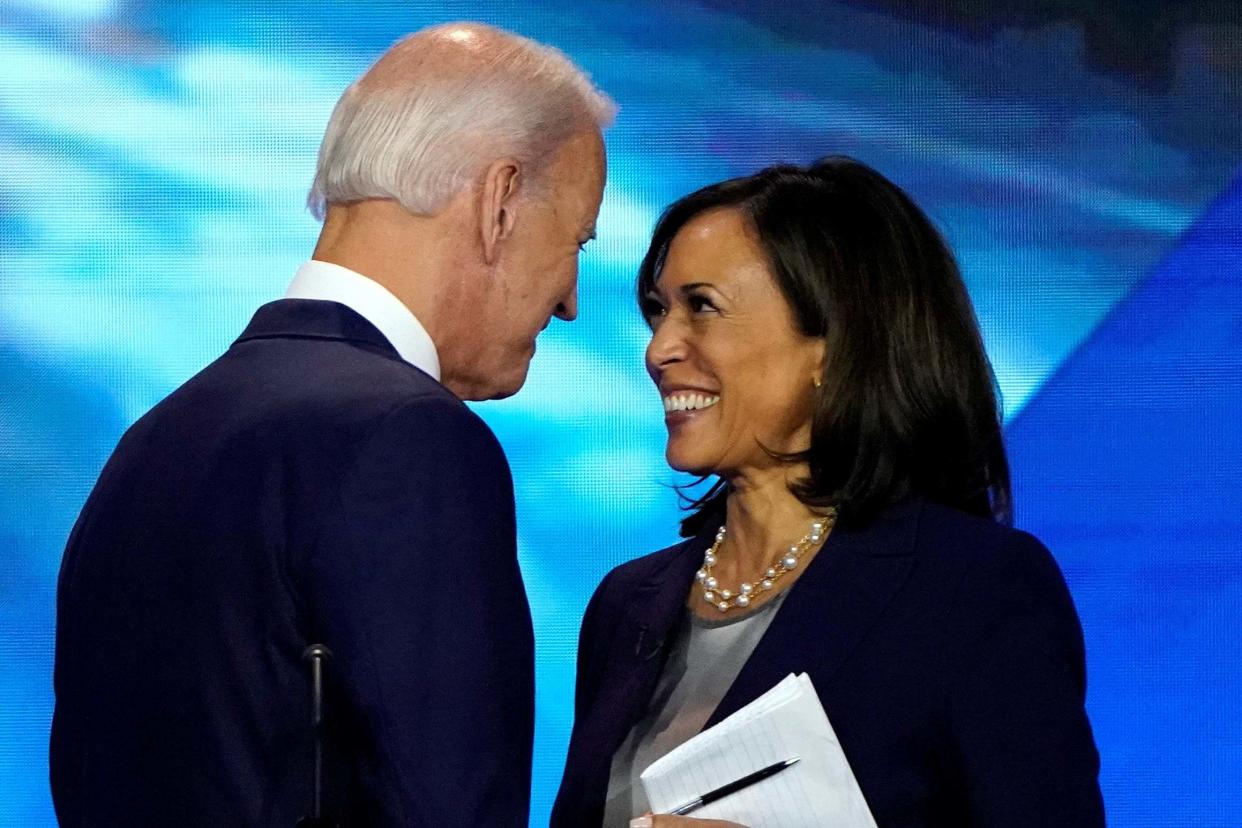Matthew d'Ancona: Picking Kamala Harris shows Joe Biden grasps the ‘fierce urgency of now’

In her memoirs published last year — The Truths We Hold — Kamala Harris described the weight of responsibility now facing Americans: “Years from now, our children and grandchildren will look up and lock eyes with us. They will ask where we were when the stakes were so high.”
This was no rhetorical flourish. The outcome of the US presidential election on November 3 will have huge ramifications not only for America, but the rest of the world: in his first four years in the White House we have seen what Donald Trump is capable of; how scornful he is of the rule of law, how poisonously divisive, and how reckless with the international order. Should he secure a second term, the potential for harm at home and abroad is colossal.
Now, as Joe Biden’s vice-presidential running mate, Senator Harris has a chance to help prevent that grisly outcome. Already, her achievement is historic: she is the first black and South Asian American woman to appear on a major party’s ticket — having been the first woman and the first person of colour to become district attorney of San Francisco; the first woman and the first person of colour to be attorney general of California; and the first black woman to be elected by that state to the Senate (and only the second ever in US history).
John Nance Garner, Franklin D Roosevelt’s first vice-president, famously described the office as “not worth a bucket of warm piss”. This is funnier than it is true. As Dick Cheney showed during George W Bush’s presidency, and Biden himself in his close partnership with Barack Obama, a vice-president, suitably empowered, can be an enormously significant figure in the White House.

The electoral impact of vice-presidential nominees is much less clear. The extent to which Lyndon Johnson helped John F Kennedy win the South in 1960 is still contested. What is certain is that a poor choice can seriously harm a campaign: John McCain’s selection of Sarah Palin in 2008 was a disaster.
Though Harris was polling solidly as a potential running mate to Biden even before yesterday’s announcement, he has not chosen her because of her appeal to a specific electoral demographic or association with a group of states. The signal he has sent is much more significant.
Harris is the most prominent senator supporting Black Lives Matter since the killing of George Floyd
If he is inaugurated as the 46th president on January 20, Biden will be, at 78, the oldest person to be sworn into that office. In March, he described himself as “a bridge”, an elder statesman who would hand over, by implication, to the younger generation after a single term in the White House. This means that, if Biden and Harris prevail in November, the latter will be the presumptive Democrat presidential nominee in 2024 —which is to say that a decision taken in the heat of the 2020 campaign could conceivably have immense implications for US politics into the late 2020s and early 2030s.
But let us not get ahead of ourselves. The most important message of Biden’s choice is that he intends — quite rightly — to make the election a referendum on Trump rather than a bid to unite the various wings of his own party by creating a “balanced” ticket. Yes, there are many of his fellow Democrats who still believe that the answer to the Right-wing populism of Donald Trump is the Left-wing populism of Bernie Sanders and his allies.
But Biden has shown that he is less interested in his party’s factional sensitivities than in the urgent business of sacking Trump and governing once he is gone. If he and Harris enter the White House, they will inherit a country in terrible trouble: economically scarred, still suffering from Trump’s appalling management of the pandemic, and horrendously divided. The remedial task facing them will be daunting.
In this respect, Harris has formidable potential. As a former prosecutor, she has a ferociously forensic and empirical style — as she showed during her cross-examination of the then attorney- general Jeff Sessions in 2017 (who complained she was making him “nervous”) and Supreme Court nominee Brett Kavanaugh, the following year. She is also an unashamed pragmatist. As she told the New York Times in July 2019: “Policy has to be relevant, That’s my guiding principle: Is it relevant? Not, ‘Is it a beautiful sonnet?’”
In 2008, when Barack Obama ran for office, America was in the mood for a sonnet. Twelve years later, it badly needs a dose of firm practicality, capability, and focus.
Which is not to say that Harris is without principle. Though she has been criticised for some of her decisions as a prosecutor — “Kamala the cop” — she was not afraid to take on Biden in the Democratic presidential debates over his previous support for segregationist senators and opposition to mandatory bussing of school pupils to encourage racial integration.
At the time, Biden was shocked by her critique. In retrospect, it probably acted as a recommendation: she would not be reticent about speaking truth to power in the Oval Office. No senator has been as prominent in supporting Black Lives Matter and demanding police reform since the killing of George Floyd in May. As vice-president, Harris would have an essential role in addressing the racial injustices that still tear at America’s soul and social fabric.
The greatest peril facing Biden’s campaign is that it has been a pudding without a theme. By picking Harris, he has shown that he grasps what Martin Luther King described as the “fierce urgency of now” and the overriding need to end what may well be remembered as the worst presidency in the history of the republic. This is not just another election. In its outcome, as she herself wrote, we all have a stake.

 Yahoo News
Yahoo News 
